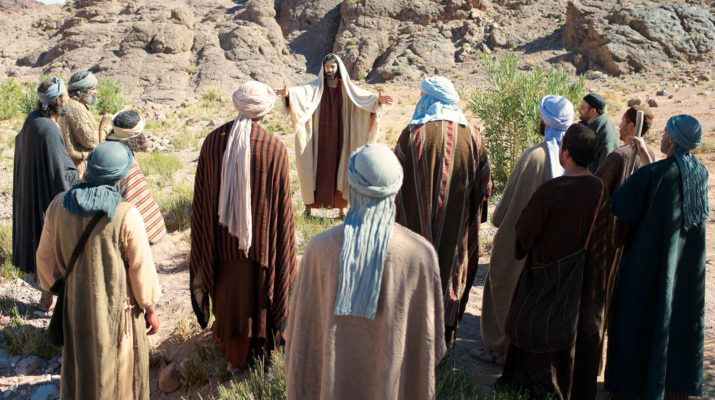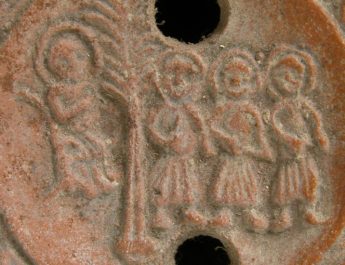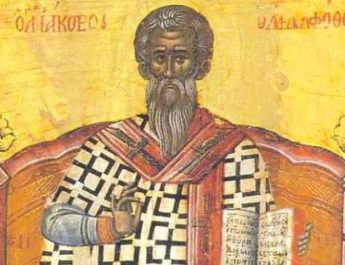John 14:23-29
Eastertide C26
23 JesusA answered him, “Those who loveB me will keepC my word,D
A “Jesus” = Iesous. From Hebrew Yehoshua (Joshua, the Lord is salvation); {from YHVH (proper name of the God of Israel; the self-existent and eternal one); {from havah (to become) or from hayah (to come to pass, become, be)} + yasha (to deliver, defend, help, preserve, rescue; properly, to be open, wide or free, which implies being safe. So, in a causative sense, this is to free someone)}. This is Jesus or Joshua in Greek – the Lord saves or the Lord is salvation.
B “love” = agapao. Perhaps from agan (much). This is love, longing for, taking pleasure in. It is divine love or human love that echoes divine love.
C “keep” = tereo. From teros (a guard or a watch that guards keep); perhaps related to theoreo (gazing, beholding, experiencing, discerning; looking at something to analyze it and concentrate on what it means; the root of the word “theatre” in that people concentrate on the action of the play to understand its meaning); from theaomai (to behold, look upon, see, contemplate, visit); from thaomai (to gaze at a spectacle; to look at or contemplate as a spectator; to interpret something in efforts to grasp its significance); from theoros (a spectator or envoy). This is to guard, observe, keep, maintain, or preserve. It can also be used figuratively for spiritual watchfulness. It is guarding something from being lost or harmed – keeping an eye on it. Contrast the Greek phulasso, which is to guard something so that it doesn’t escape. Also contrast koustodia, which generally denotes a fortress or military presence. This word can mean fulfilling commands, keeping in custody, or maintaining. It can also figuratively mean to remain unmarried.
D “word” = logos. From lego (to speak, tell, mention). This is word, statement, speech, analogy. It is a word that carries an idea or expresses a thought, a saying. It could refer to a person with a message or reasoning laid out in words. By implication, this could be a topic, line of reasoning, or a motive. It can be used for a divine utterance or as Word – Christ.
and my FatherE will love them, and we will comeF to them and makeG our homeH with them. 24 Whoever does not love me does not keep my words; and the word that you hearI is not mine, but is from the Father who sentJ me.
E “Father” = Pater. This is father in a literal or figurative sense. Could be elder, senior, ancestor, originator, or patriarch.
F “come” = erchomai. This is to come or go.
G “make” = poieo. This is to make, do, act, construct, abide, or cause.
H “home” = mone. 2x in NT. From meno (to stay, remain, wait, await, continue, abide, endure; to literally stay in a place or to remain in a condition; to continue with hope and expectation). This is an abode, lodging, or residence. It is the act of abiding or the place in which one abides.
I “hear” = akouo. This is hear or listen, but it also means to understand by hearing. This is where the word “acoustics” comes from.
J “sent” = pempo. This is to send, put forth, or dispatch. This often refers to a temporary errand. It is sending someone with a focus on the place they departed from. By contrast, another Greek word, hiemi, emphasizes the destination and yet another word, stello, focuses on the motion that goes with the sending.
25 “I have said these things to you while I am stillK with you. 26 But the Advocate,L the HolyM Spirit,N
K “am still” = meno. Related to “home” in v23. See note H above.
L “Advocate” = Parakletos. 5x in NT. From parakaleo (to call to, summon, invite, request, or beg; to exhort or admonish; to encourage, comfort, or console; has legal overtones and is used of one’s advocate in a courtroom); {from para (beside, by, in the presence of) + kaleo (to call by name, invite, to name, bid, summon, call aloud); {related to keleuo (to command, order, direct); from kelomai (to urge on)}}. This is someone who is called for aid or assistance. Properly, it refers to a legal advocate who is close to the situation and speaks in court. This is advocate, helper, comforter, helper, or intercessor. It is also used as a technical term for the Holy Spirit – the Paraclete.
M “Holy” = Hagios. From hagnos (holy, sacred, pure ethically, ritually, or ceremonially; prepared for worship, chaste, unadulterated, pure to the core; undefiled by sin; figurative for innocent, modest, perfect). God is totally different from humanity and thus set apart. That which is consecrated to worship God (elements of worship) or to serve God (as the saints) are holy because they are now set apart for God’s purposes. Holy because important to God. This is sacred physically, pure. It can be morally blameless or ceremonially consecrated.
N “Spirit” = Pneuma. From pneo (to blow, breathe, breathe hard). This is wind, breath, or ghost. A breeze or a blast or air, a breath. Figuratively used for a spirit, the human soul or part of us that is rational. It is also used supernaturally for angels, demons, God, and the Holy Spirit. This is where pneumonia comes from.
whom the Father will send in my name,O will teachP you everything,Q and remindR you of allS that I have said to you.
O “name” = onoma. May be from ginosko (know, recognize, learn from firsthand experience). This is a name, authority, cause, character, fame, reputation. The name was thought to include something of the essence of the person so it was not thought to be separate from the person.
P “teach” = didasko. From dao (learn). This is to teach, direct, instruct, or impart knowledge. In the New Testament, this is almost always used for teaching scripture.
Q “everything” = pas. This is all or every.
R “remind” = hupomimnesko. Related to “home” in v23 & “am still” in v25. 7x in NT. From hupo (by, under, about, subordinate to) + mimnesko (to remind or remember; memory through an active, intentional process or being mindful; not incidentally or accidentally remembering); {from mnaomai (to remember; by implication give reward or consequence); perhaps from meno (see note K above)}. This is to remind, call attention to.
S “all” = pas. Same as “everything” in v26. See note Q above.
27 PeaceT I leaveU with you; my peace I giveV to you. I do not give to you as the worldW gives.
T “peace” = eirene. Perhaps from eiro (to join, tie together to form a whole). This is one, peace, quietness, rest, peace of mind, harmony. Peace was a common farewell among Jews (i.e. shalom) and this well-wishing included a blessing of health and wholeness for the individual. This word also indicates wholeness and well-being – when everything that is essential is joined together properly. This is peace literally or figuratively. By implication, it is prosperity (but not in the sense of excessive wealth. Prosperity would have meant having enough from day to day.)
U “leave” = aphiemi. From apo (from, away from) + hiemi (to send). This is send away, release, permit, forgive, allow to depart, discharge, or send forth.
V “give” = didomi. To give, offer, place, bestow, deliver. This is give in a literal or figurative sense.
W “world” = kosmos. Perhaps from the base of komizo (to carry, convey, recover); from komeo (to take care of). This is order, the world, the universe, including its inhabitants. Literally, this is something that is ordered so it can refer to all creation. It can also refer to decoration in the sense that something is better ordered and, thus, made more beautiful. This is where “cosmos” and “cosmetics” come from.
Do not let your heartsX be troubled,Y and do not let them be afraid.Z
X “hearts” = kardia. Literally the heart, but figuratively mind, character, inner self, will, intention, thoughts, feelings. Also, the center of something. The word heart is only used figuratively in the Old and New Testaments. This is where “cardiac” comes from.
Y “be troubled” = tarasso. 18x in NT. This is trouble, agitate, stir up. It is motion back and forth, creating inner turmoil or confusion, roiling water.
Z “be afraid” = deiliao. 1x in NT. From deilia (cowardice, reticence); from deilos (fearful, timid, faithless, fear of losing); {from deos (fear, reverence) or deido (to fear)}. This is to live in fear, be timid. It is living with an intense fear of consequences.
28 You heard me say to you, ‘I am going away,AA and I am coming to you.’ If you loved me, you would rejoiceBB that I am goingCC to the Father,
AA “going away” = hupago. From hupo (by, under, under the authority of) + ago (lead, bring, guide, spend, drive, carry). This is to lead under so to depart, go away, or die. It is to lead away under the command of someone else, being given a mission or objective to carry out.
BB “rejoice” = chairo. From char– (to extend favor, lean towards, be inclined to be favorable towards). This is to rejoice, be glad or cheerful; a greeting. This is the root verb that the Greek word for “grace” comes from (charis).
CC “going” = poreuomai. From poros (ford, passageway). This is to go, travel, journey, or die. It refers to transporting things from one place to another and focuses on the personal significance of the destination.
because the Father is greaterDD than I. 29 And now I have told you this before it occurs,EE so that when it does occur, you may believe.FF
DD “greater” = megas. This is big in a literal or figurative sense – great, large, exceeding, abundant, high, mighty, perfect, strong, etc.
EE “occurs” = ginomai. This is to come into being, to happen, become, be born. It can be to emerge from one state or condition to another or is coming into being with the sense of movement or growth.
FF “believe” = pisteuo. From pistis (faith, faithfulness, belief, trust, confidence; to be persuaded or come to trust); from peitho (to have confidence, urge, be persuaded, agree, assure, believe, have confidence, trust). This is to believe, entrust, have faith it, affirm, have confidence in. This is less to do with a series of beliefs or doctrines that one believes and more to do with faithfulness, loyalty, and fidelity. It is trusting and then acting based on that trust.
Image credit: “Jesus Chooses Twelve Disciples to be Apostles” by LUMO Project.




